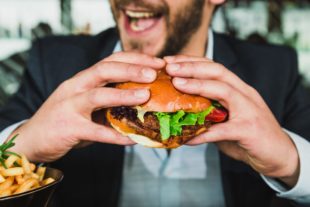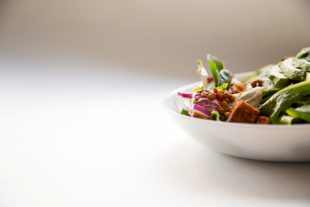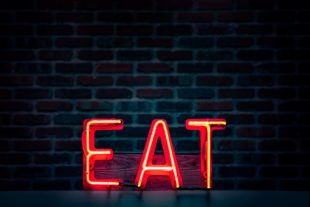A Biblical Take on HALTing Addiction Triggers: Hunger
Christian Counselor Spokane
 In addiction recovery parlance, the acronym HALT refers to four common situational triggers for relapse: in the heat of temptation, is the addict Hungry, Angry, Lonely or Tired? If so, recognize and mitigate the known factors to increase the odds of staying clean.
In addiction recovery parlance, the acronym HALT refers to four common situational triggers for relapse: in the heat of temptation, is the addict Hungry, Angry, Lonely or Tired? If so, recognize and mitigate the known factors to increase the odds of staying clean.
In the war against addiction, wisdom calls for addressing these common predispositions, but let’s look at the spiritual correlate of each of these triggers, starting with hunger. What does the Bible say about this state of being and a Christian’s stance toward temptation?
Hunger for More than Bread
Man shall not live by bread alone, but by every word that proceeds from the mouth of God. – Matthew 4:4
Few Bible verses are so understated as this one describing Christ after forty days of fasting in the wilderness. “He was hungry” (Matthew 4:2). Humans can live four to six, possibly eight, weeks without food. Jesus kept not only His wits but also His priorities intact after almost six weeks of physical deprivation.
Satan challenged the famished God-man to take control by turning the desert stones into bread. Jesus remained clear in His resolve, relying on His Father to sustain Him in His Father’s timing, Then Jesus rebuked the Devil for tempting Him. Jesus refused to take a shortcut.
Jesus went on to urge His followers not to worry about their physical needs. “Is not life more than food, and the body more than clothes?” (Matthew 6:25b) Babies know only their own needs, the epitome of self-centeredness. A child’s untrained mind intuitively grasps for security and comfort.
With maturity we take others into account, deferring our own desires as we deem necessary, learning not to pay homage so readily to our appetites. Where is the adult’s attention riveted, on what is missing in personal comfort, or what is supplied in the bigger picture? A new mother foregoes sleep to nurse her baby. On the other end of life, a family grieving their loved one’s passing forget to eat – the loss overrides awareness of the need for food.
Naturally, it is wise to avoid letting one’s blood sugar drop precipitously, whether fighting addiction or not. But in either case, God can sustain us even when our bodies are not optimized.
 Put to the test, the prophet Daniel and his friends had “only vegetables to eat and water to drink” for ten days while they prayed to God, yet looked healthier than the palace staff who had feasted. Seeking God’s agenda first aligns all other priorities below.
Put to the test, the prophet Daniel and his friends had “only vegetables to eat and water to drink” for ten days while they prayed to God, yet looked healthier than the palace staff who had feasted. Seeking God’s agenda first aligns all other priorities below.
God can sustain you even when your stomach groans, even when you thirst, removing the need for panic. (“Stress eating” or bingeing usually involves anxiety.) As Solomon notes in Proverbs 18:14, “The spirit of a man can endure sickness (or in this case, hunger), but a crushed spirit who can bear?”
Satan tempted Jesus to make rocks into bread, the second verse of the song he used many generations before, planting a few choice seeds of doubt for our first parents. Did God really say not to eat this? How could He! Go ahead and take the fruit. Yes, it’s off-limits, but you deserve this. God is holding out on you.
Modern Believers face the same temptation to doubt God’s goodness and providence in the face of our legitimate needs. Toddlers aren’t the only ones demanding to do it themselves.
God Keeps His Own Counsel
Waiting is hard. In Genesis 15, God promises Abram descendants that outnumber the stars (vs. 5) despite the fact that his wife Sarah had long been barren. Defying common sense, Abraham believes the Lord, and God credits “it to him as righteousness” (vs. 6).
By Genesis 16 Sarah is tired of her infertility. God promised her husband offspring but didn’t say how or when. God does not elucidate the plan until Chapter 17 (even then, Isaac is not born for another 11 years). You can read the bitterness in her proposition. “The Lord has kept me from having children. Go, sleep with my slave; perhaps I can build a family through her,” a common practice at the time.
 Abraham obliges, triggering a cascade of domestic feuding over child-bearing. Like her foremother Eve, Sarah proposes plan B; like his forefather Adam, Abraham does not resist the temptation to “fix things” proffered by his resourceful wife. History is replete with humans taking God-ordained matters into their own hands with dire consequences.
Abraham obliges, triggering a cascade of domestic feuding over child-bearing. Like her foremother Eve, Sarah proposes plan B; like his forefather Adam, Abraham does not resist the temptation to “fix things” proffered by his resourceful wife. History is replete with humans taking God-ordained matters into their own hands with dire consequences.
Satan uses a few variations on the DIY theme. One can rationalize the indulgence as acceptable, compared to greater sins. The drug of choice is a “treat” we have earned after x number of days behaving.
Picture Gollum stroking the Ring he considered so “precious” that he killed for it. See Satan’s twisted perspective? Ignore the giver and grab the gift. Clutch the lusted-after object as the sine qua non for existence, believing the lie that we truly “gotta have it.”
What is Your Precious?
Addiction is a form of idolatry. Physical withdrawal symptoms notwithstanding, the spiritual and psychological attachments are more tenacious, and are not limited to chemicals. Any hunger satisfied outside God’s blessing can become an idol.
One person escapes reality using the finest fare (note the abundance of Instagram “food porn”), another person uses alcohol or lusts after the latest techno-gadget, and still another seeks acclaim in his profession. Some of these endeavors reflect escapism, but all stem from a misdirected passion for life beyond this life.
 Addiction can be met with empathy instead of shame because any one of us could “fill the void” with that addict’s drug of choice given the right circumstances. Even a worthy cause like saving the whale or fighting sex trafficking – anything or idea we insist upon or cannot live without will compete for preeminence in our private musings that then motivate our behaviors, habits, and destiny. It is no wonder that Solomon warns, “Guard your heart with all diligence, for from it flow the springs of life” (Proverbs 4:23).
Addiction can be met with empathy instead of shame because any one of us could “fill the void” with that addict’s drug of choice given the right circumstances. Even a worthy cause like saving the whale or fighting sex trafficking – anything or idea we insist upon or cannot live without will compete for preeminence in our private musings that then motivate our behaviors, habits, and destiny. It is no wonder that Solomon warns, “Guard your heart with all diligence, for from it flow the springs of life” (Proverbs 4:23).
Seek Supernatural Sustenance
Chemical dependency experts note the correlation between the strength of one’s addiction and her capacity for deep spiritual connection. Naturally, those who practice the arts and music, media that have more ready access to the human soul, are predisposed to addiction.
Historically, creatives often fall into particular chemical dependencies, but their hunger for meaning is universal. (Two caveats: first, artists live in the public eye, so the misapplication of their affections – as Jonathan Edwards would say – is more apparent. Second, the term “mood-altering chemical” is arbitrary given that a hit of heroin, winning a video game, or even the pain of self-injury all trigger the release of endorphins, the original feel-good chemical.)
Ecclesiastes 3:11 says, “God has placed eternity in the hearts of men, and they cannot fathom what God has done from beginning to end.” Awareness of the supernatural is like the soundtrack we sense should accompany the silent actions we observe in our lives. God’s interactions with humankind provide the texture, color, and context for understanding the smaller-scale dramas in the quest to grow more like Christ.
Happily, our Lord does not leave us longing indefinitely. Rather, “everyone who asks receives, and the one who searches finds, and to the one who knocks, the door will be opened” (Matthew 7:8). God set up the plan for man’s salvation and sanctification, “while we were yet sinners” but He goes on to reward those who respond to His divine initiative, pursuing Christ with the same desperation of an addict running low.
Like the Prodigal Son’s father, God loved us with abandon. Will we also stop at nothing to know Christ and the power of His resurrection? Independent study may yield a measure of insight. More often, though, we need others to show us our blind spots and how to appropriate God’s abundant resources for living well.
Many around us seem “fine” out of relationship with God, but in the end, every other lover will leave us. As the song says, “you gotta serve somebody.” The path humans naturally choose when living for their appetites is wide, easy and ultimately, tragic.
Praise God there is hope. One day we’ll no longer need to halt. Christ’s way is narrow and difficult, but His Holy Spirit, His Word, and His Church, all sustain and enrich us until the day our Lord will spread a wedding feast before His bride, and He proceeds to make all things new.
“The Burger”, Courtesy of Sander Dalhuisen, Unsplash.com, CC0 License; “The Salad”, Courtesy of Hermes Rivera, Unsplash.com, CC0 License; “The Omelet”, Courtesy of Angelo Pantazis, Unsplash.com, CC0 License; “Eat”, Courtesy of Tim Mossholder, Unsplash.com, CC0 License





